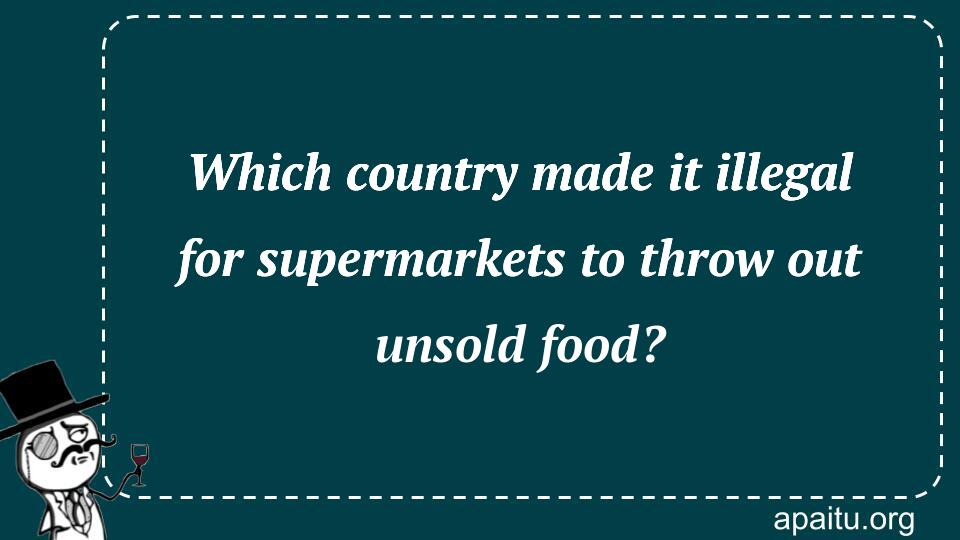Question
Here is the question : WHICH COUNTRY MADE IT ILLEGAL FOR SUPERMARKETS TO THROW OUT UNSOLD FOOD?
Option
Here is the option for the question :
- France
- Norway
- Germany
- Japan
The Answer:
And, the answer for the the question is :
Explanation:
One of a series of groundbreaking legislation, France became the first country in the world to forbid large supermarkets from tossing unsold food that hasn’t exceeded the expiration date. In the past, such food has often been destroyed or thrown out, but with the new law, supermarkets must donate the unsold food to charities and food banks. – It is anticipated that the new law will make it possible for food banks to distribute an additional 10 million meals each year. The people who support this legislation have high hopes that it will soon be implemented across the entirety of the EU.

In 2016, France became the first country in the world to make it illegal for supermarkets to throw out unsold food. This groundbreaking law was introduced to combat food waste, which is a growing problem around the world. The French government took action to address this issue by passing a law that required supermarkets to donate unsold food to charity or use it for animal feed or compost.
The law has been successful in reducing food waste in France, with supermarkets now required to sign contracts with charities to ensure that unsold food is donated to those in need. The law also encourages supermarkets to sell imperfect or expired food at reduced prices, rather than throwing it away.
The issue of food waste is a global problem, with an estimated 1.3 billion tons of food being wasted each year. This waste not only contributes to greenhouse gas emissions, but it also means that resources such as water, land, and energy are being wasted. In addition, millions of people around the world go hungry, and food waste exacerbates this problem.
France’s law has inspired other countries to take action on food waste. Italy, for example, has introduced a law that encourages businesses to donate unsold food to charity, while Spain and Portugal have also taken steps to reduce food waste. The European Union has set a target to reduce food waste by 50% by 2030, and many countries around the world are taking steps to achieve this goal.
there are also many grassroots initiatives aimed at reducing food waste. Community fridges, for example, have become popular in many countries, allowing people to donate and collect surplus food. Food banks and charities also play a vital role in redistributing surplus food to those in need.
France’s law banning supermarkets from throwing out unsold food has been a significant step in the fight against food waste. The law has inspired other countries to take action and has raised awareness of the issue of food waste around the world. While there is still much work to be done, initiatives such as this give hope that we can reduce food waste and ensure that everyone has access to the food they need.